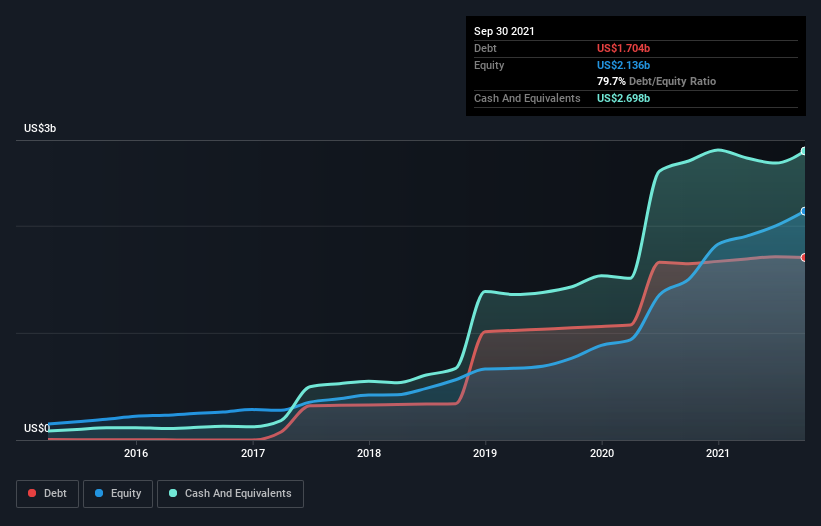DexCom (NASDAQ:DXCM) Has A Rock Solid Balance Sheet
Warren Buffett famously said, 'Volatility is far from synonymous with risk.' When we think about how risky a company is, we always like to look at its use of debt, since debt overload can lead to ruin. As with many other companies DexCom, Inc. (NASDAQ:DXCM) makes use of debt. But is this debt a concern to shareholders?
Why Does Debt Bring Risk?
Debt is a tool to help businesses grow, but if a business is incapable of paying off its lenders, then it exists at their mercy. In the worst case scenario, a company can go bankrupt if it cannot pay its creditors. However, a more usual (but still expensive) situation is where a company must dilute shareholders at a cheap share price simply to get debt under control. Of course, debt can be an important tool in businesses, particularly capital heavy businesses. The first thing to do when considering how much debt a business uses is to look at its cash and debt together.
Check out our latest analysis for DexCom
What Is DexCom's Net Debt?
The chart below, which you can click on for greater detail, shows that DexCom had US$1.70b in debt in September 2021; about the same as the year before. However, its balance sheet shows it holds US$2.70b in cash, so it actually has US$994.4m net cash.
How Strong Is DexCom's Balance Sheet?
Zooming in on the latest balance sheet data, we can see that DexCom had liabilities of US$734.9m due within 12 months and liabilities of US$1.90b due beyond that. Offsetting this, it had US$2.70b in cash and US$529.1m in receivables that were due within 12 months. So it can boast US$587.2m more liquid assets than total liabilities.
This state of affairs indicates that DexCom's balance sheet looks quite solid, as its total liabilities are just about equal to its liquid assets. So it's very unlikely that the US$43.4b company is short on cash, but still worth keeping an eye on the balance sheet. Simply put, the fact that DexCom has more cash than debt is arguably a good indication that it can manage its debt safely.
We note that DexCom grew its EBIT by 24% in the last year, and that should make it easier to pay down debt, going forward. There's no doubt that we learn most about debt from the balance sheet. But ultimately the future profitability of the business will decide if DexCom can strengthen its balance sheet over time. So if you're focused on the future you can check out this free report showing analyst profit forecasts.
Finally, a company can only pay off debt with cold hard cash, not accounting profits. DexCom may have net cash on the balance sheet, but it is still interesting to look at how well the business converts its earnings before interest and tax (EBIT) to free cash flow, because that will influence both its need for, and its capacity to manage debt. During the last three years, DexCom produced sturdy free cash flow equating to 60% of its EBIT, about what we'd expect. This free cash flow puts the company in a good position to pay down debt, when appropriate.
Summing up
While we empathize with investors who find debt concerning, you should keep in mind that DexCom has net cash of US$994.4m, as well as more liquid assets than liabilities. And it impressed us with its EBIT growth of 24% over the last year. So is DexCom's debt a risk? It doesn't seem so to us. When analysing debt levels, the balance sheet is the obvious place to start. But ultimately, every company can contain risks that exist outside of the balance sheet. For example DexCom has 3 warning signs (and 1 which doesn't sit too well with us) we think you should know about.
Of course, if you're the type of investor who prefers buying stocks without the burden of debt, then don't hesitate to discover our exclusive list of net cash growth stocks, today.
Have feedback on this article? Concerned about the content? Get in touch with us directly. Alternatively, email editorial-team (at) simplywallst.com.
This article by Simply Wall St is general in nature. We provide commentary based on historical data and analyst forecasts only using an unbiased methodology and our articles are not intended to be financial advice. It does not constitute a recommendation to buy or sell any stock, and does not take account of your objectives, or your financial situation. We aim to bring you long-term focused analysis driven by fundamental data. Note that our analysis may not factor in the latest price-sensitive company announcements or qualitative material. Simply Wall St has no position in any stocks mentioned.

